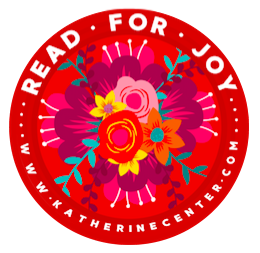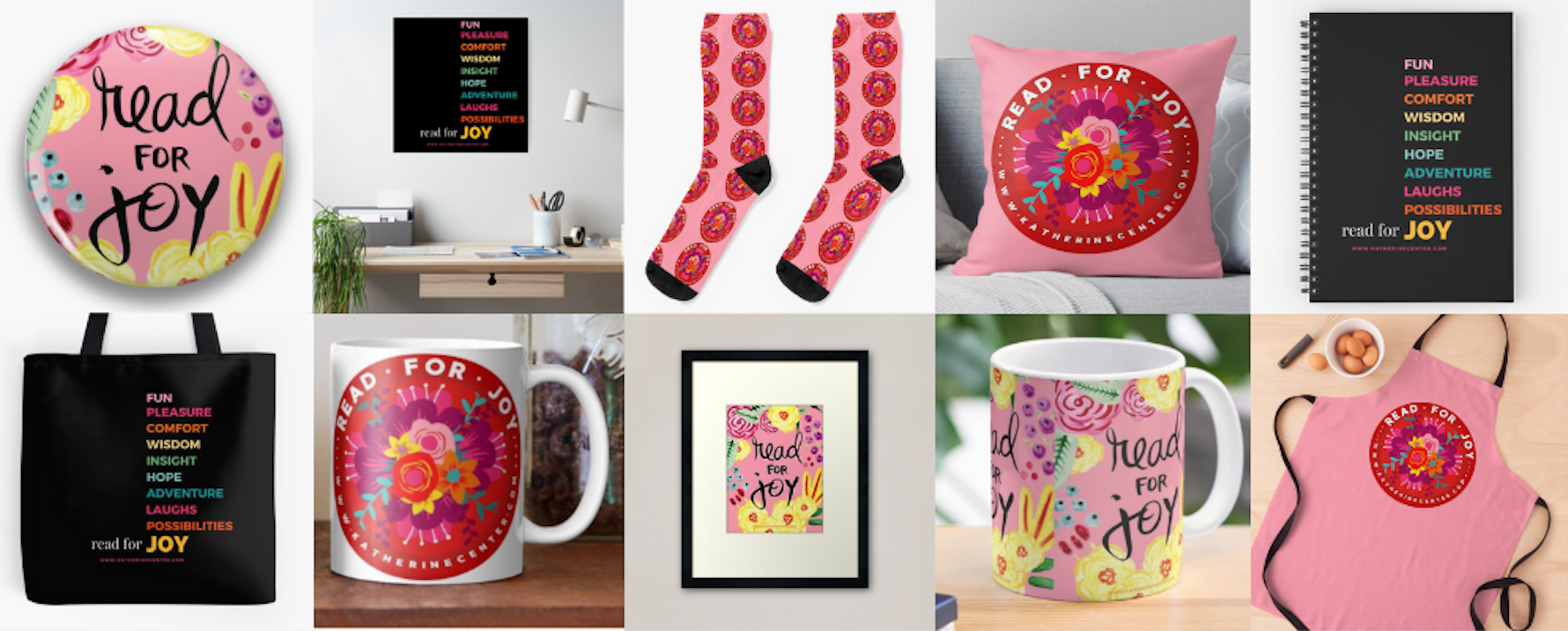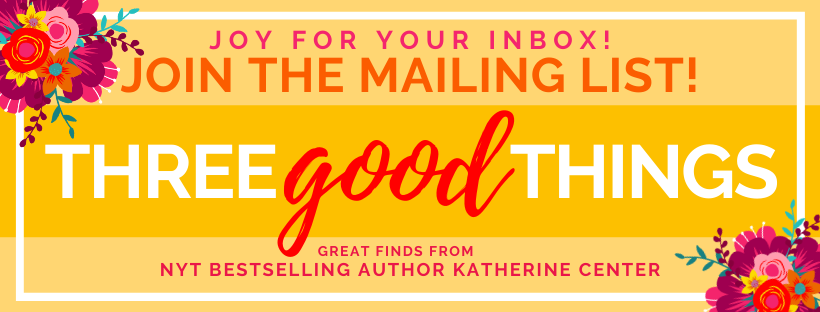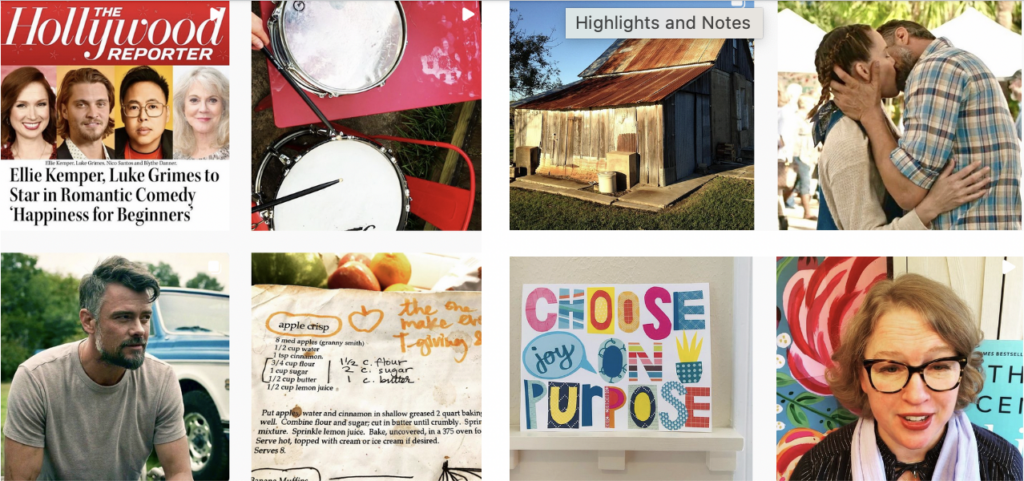
What does it mean to READ FOR JOY?
Reading for joy means reading for fun. Reading for pleasure. Reading what you want to read, instead of what you’ve been taught you should want to read.
Reading for joy means realizing that there’s not only one good kind of story. It’s a process of literary de-snobification: Recognizing that there are all different kinds of good.
Reading for joy means following your own compass about what stories call to you, and hook you, and resonate for you.
It’s a way of discovering what matters—for yourself.
It’s a way of taking care of yourself, a way of wrestling with the answers to soul-deep questions—questions so deep, you might not even know you’re asking them.
Reading for joy means reading from the inside out. Reading with the heart instead of only with the head. And trusting yourself to find the stories that you most need to hear.
⬇️ Scroll down to read the full essay! ⬇️

Get READ FOR JOY merch!
Click HERE to shop for READ FOR JOY notebooks, t-shirts, socks, backpacks, totes, mugs, buttons . . . and so much more! Just click on the design you like to see all the products.

Here’s Katherine reading part of the essay below about how to read for joy.

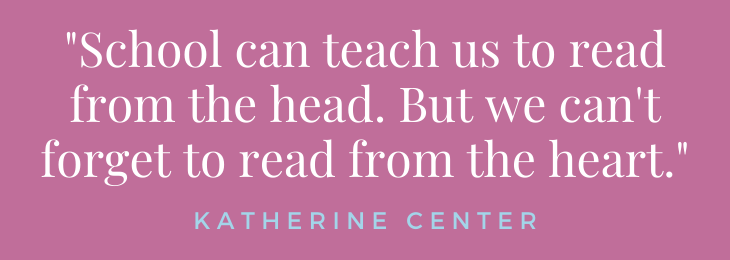
READ FOR JOY
I wrote my first novel when I was in the sixth grade—and it was fan fiction about Duran Duran.
Sixth grade was, shall we say, not my best year. I was desperately awkward and deeply fashion-challenged—so much so that my big sister had to stage an intervention with my mom and beg her to take me to the mall for a makeover because I was bringing down the whole family.
It’s fine. Everybody’s awkward in middle school.
But the hard part for me was that I knew I was awkward. The lucky kids flutter through those years like butterflies through the rain, never totally clear on how bad it is—but I wasn’t lucky that way. I knew. I knew I it was bad. I just didn’t know what to do about it. And so I basically just spent that entire year just hunched over in apology, like, “I’m sorry. There’s no excuse for this.”
But I was lucky in one way. I had two best friends who were also awkward, and also miserable, and also—like me—desperately, obsessively, breathlessly in love with Duran Duran.
Somehow, we got the idea that year that we should write novels about meeting the band . . . and we should cast ourselves as the main characters of those novels.
And so we did.
We’d suffer through the school week as only sixth grade girls can suffer—and then we’d get together on weekends and have sleepovers and bust out our spiral notebooks and read our novels to each other in installments. And we all politely included each other in our stories, so it was truly a feast of Duran-Duran-themed fiction.
Here’s what happened in mine:
Duran Duran is driving through my suburban neighborhood in Houston, Texas, on their way to a concert when, as luck would have it, they get a flat tire right in front of my house. It’s the 1980s, so there are no cell phones, so they have to find a land line to call a tire guy, and so they walk up to the nearest front door, which just happens to be my front door, and I just happen to be home at the time, watching MTV and busting my dance moves to their Hungry Like the Wolf video.
I hear the bell, open the door, and find all five members of Duran Duran standing on my front stoop looking deadly handsome in their rocker gear.
I freak out internally, but I play it cool.
I invite them in, let them use the phone, and make them microwave popcorn for a snack.
And I don’t know what’s going on with the tire guy that day, but he must be pretty busy, because we wind up waiting a long time. Hours. All afternoon. Long enough that by the time he finally arrives . . . magically, astonishingly, impossibly . . . in that one afternoon, all five of them have fallen in love with me.
And that’s the entire plot.
I spend the rest of the novel deciding who to marry.
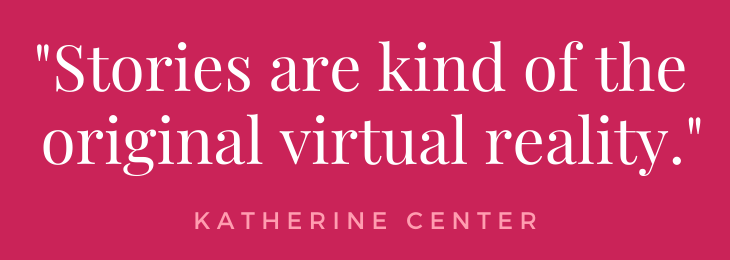
It was, of course, the worst novel ever written.
I still have the notebook it’s written in, now yellowing and frayed, up in my attic in a storage tub. My older sister has explicit instructions, if I am ever hit by a bus, to find it—immediately—and burn it. Like: Do not go to the funeral. Get to the attic and burn that novel.
But as humiliated by it as I truly am, I’m also, at the exact same time, really proud.
The writing is genuinely atrocious . . . but the idea of that novel was genius.
Because I was sinking in sixth grade. I was going down in flames. I was falling apart. I spent most days making mental lists of my flaws and wishing I were anyone on earth but me.
I truly did not have one kind word for myself. I was basically my own personal Mean Girl.
But writing that story that year with those friends gave me my first inkling of something that’s become a bedrock truth in my life.
Stories can save you.
Somehow, by chance or good luck, I wound up writing a story filled with characters who could say all the kind, and encouraging, and hopeful things to me that I refused to say to myself. Things I so desperately needed to hear.
At a moment in my life when I felt like there was no hope, I wrote a story that created it. At a moment when I felt utterly unlovable, I created characters who disagreed.
Duran Duran thought I was awesome.
That was the moment I got hooked on stories—on fiction’s particular brand of magic. From then on, I was doomed to want to be a writer and to spend the rest of my life obsessing over stories: how they work, and why they matter, and what makes them so powerful.
And after all that thinking—all those writing workshops, and English classes, and time picking stories apart to study their innards—I have figured out a few smart things about stories. And I can confirm: they really can change your life.
Here’s what makes stories so powerful. We know they’re not true . . . but we believe them anyway.
When you read a novel (or watch a movie, or binge-watch a series), you know that it’s fiction. You know it’s all made up. You don’t really think it’s true.
But it feels true.
This is how stories make you cry. This is how they make you laugh, and get you angry, and make you swoon.
Studies using brain imaging have shown that when you read about a character doing something, parts of your brain light up as if you were actually doing that thing yourself.
On some very basic level, your brain can’t tell the difference.
I remember watching a movie a while back where a character’s beloved dog died . . . and crying over the dog. I knew that dog was an actor, and that after they filmed the scene, he popped up, got a treat, and trotted off. No animals were harmed!
But I cried anyway.
I knew it wasn’t real, but I believed it anyway.
That’s powerful stuff.
This is how stories work. This is how they bypass all our categories and prejudices and opinions—and just reach right into our chests to grab ahold of our hearts.
If a story is well done, we absolutely believe it. But a good story is more than just credible. It does more than just suspend your disbelief.
A good story makes you believe it—but it also makes you feel it.
When I cried over that fictional dog, I was doing more than just watching a made-up moment and believing it was true. I was empathizing.
I was identifying so strongly with the main character of that story that I was feeling her feelings about the dog with her. I was feeling them as her. It was like I’d stepped inside her skin—like we’d merged a little bit, somehow, and I wanted what she wanted, and I cared about what she cared about, and I felt her feelings.
How amazing is that?
Stories let us cross the boundaries between ourselves and other people. What an astonishing feat of the human imagination! To imagine what it’s like to be someone else—someone who doesn’t even exist—so completely that you feel her feelings as if they were your own? Astonishing.
And yet, we do it all the time. We don’t even notice. It’s no big deal.
Stories are kind of humanity’s secret sauce.
They allow us to imagine what it’s like to be someone else so completely that we can learn from their experiences as if they were our own.
Stories teach us how to put ourselves in others’ shoes. They teach us empathy, one detail at a time. That’s ultimately what storytelling is. When writers write, they’re not just trying to recite the events of the story, they’re trying to make you care about those events. They’re trying to make what happens matter.
And the way to do that is to pull you inside the body, heart, and mind of the point-of-view character so completely that, as you read, it’s like it’s happening to you.
Writers spend their entire lives learning strategies for making that happen, and in some ways, we’re fighting an uphill battle. It’s not easy to get people’s attention and hold it. Readers have distractions, obligations, other things they should be doing.
But stories have one amazing thing going for them.
Stories are constructed almost exactly like memories.
That’s right: Memories are constructed.
We tend to think of memories as something we retrieve—almost as if our brains house enormous, infinite libraries. As if when somebody asks you a question like, “What did you do on your eighteenth birthday?”—you just look up the file for that date in in your brain and replay the recording. As if remembering is just about finding it.
But that’s not how it works at all.
You don’t encode everything about every point in time into memory. Most moments, you don’t encode at all. Special ones get encoded—your first kiss, or the day you got your drivers’ license, or your high school graduation—but even then, you’re not encoding everything. Look around you right now and notice all the infinite details—from the countless objects in the room, to the air temperature, to the color of the light, to what you’re wearing.
You couldn’t possibly even notice it all—much less hold onto it.
So you choose.
And you choose without even thinking about it. You choose the details that stand out the most or get your attention. And then twenty years later, when someone asks you to remember the moment when you first read, say, Katherine Center’s seminal essay on reading for joy, you pull out those details and remember them for certain: You were sitting on the sun porch. It was morning. You were drinking coffee with cream. Maybe it was spring—you think.
And that’s about it.
The rest of the memory, you make up.
You fill it in with details so plausible, you even believe them yourself.
Just exactly like you do when you read fiction.
There’s a reason we love stories so much, and it’s because our lives are made of them.
That’s why, when you read a novel, you already know exactly what to do. You do it all day, every day, as you tell yourself the story of your life.
With a novel, the author gives you the details, and then you fill in the rest. I write “apple,” but then you decide what kind of apple it is. Maybe a Granny Smith. Maybe a Gala. You decide without even noticing, building the story effortlessly, and then move on.
This is why stories you’ve read have direct access to your heart. You know they didn’t happen to you, but they feel like they did—and they feel like they did because you built them in your head exactly the way you build your own memories. I’ve never time-traveled in Scotland, but I feel like I have because I read Outlander. I’ve never worked for the French Resistance, but I feel like I have because I read The Nightingale. I’ve never eaten potato peel pie, or been turned into a vampire, or insulted Mr. Darcy.
But I remember it all.
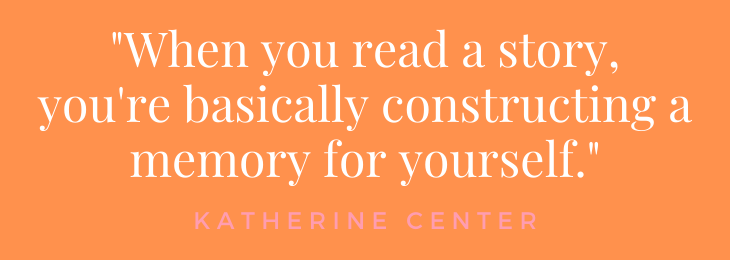
A few years ago, at a party, I met a woman who was very embarrassed to confess to me that despite the goal she’d set for herself to spend the entire year reading all the works of Faulkner, she hadn’t gotten very far.
She winced with shame as she confessed, “I just keep falling asleep.”
“Oh, honey,” I said. “That’s not your fault. That’s Faulkner’s fault.” Then I leaned in and gave her a look. “If he’s not keeping you awake, he’s not doing his job.”
Right?
There’s a quote I love about writing by Dwight V. Swain: “A story is something you do to a reader.”
I think about that all the time. What do I want my stories to do to people? How do I want to make them feel?
Because stories are, at their cores, emotion machines. They can make us laugh, make us cry, make us angry, make us fall in love, make our hearts sprint with fear. They distill human experience, and capture its meaning, and connect us to our humanity like nothing else can. They are the closest thing we have to magic.
At the very least, they should keep us awake.
But we tend to think it’s our fault when they don’t.
I blame school.
We all had to learn to read—and do that at the mercy of adults who were watching us and judging us—even with best of intentions. We all had to learn vocab words, and take spelling tests, and get graded on our reading comprehension. We all spent years and years in classrooms—where we came to think about reading and stories through many lenses.
None of them our own.
I suspect a lot of people who loved to read as kids lost hold of that love as they grew up—as reading became more about achievement, and grades, and figuring out what the teacher wanted—and less about pleasure, and fun, and play.
I suspect that once reading becomes academic, it forces us to read from our heads instead of our hearts.
But it’s what we do from the heart that matters.
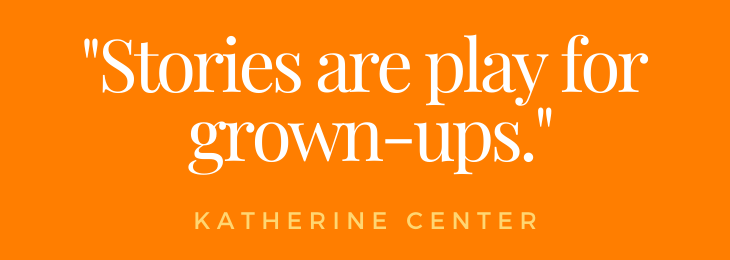
When I talk about reading for joy, I’m talking about reading from the heart.
When I talk about reading for joy, I’m talking about reading the stories you want to read, rather than the stories we think you should want to read. I’m talking about a process of de-snobification—of letting go of the idea that stories exist in a hierarchy, with literary fiction up at the top and all other types descending down toward embarrassing.
Stories aren’t a hierarchy.
Stories are a universe.
Stories are a twinkling, unfathomable, infinite Milky Way of possibilities.
And I’m not picking on literary fiction—or Faulkner.
I’m just saying, there are all different kinds of good—in all different ways, at all different times in your life.
The best analogy I can come up with is music. There are all different kinds of music. There’s country and hip-hop and classical and folk and rock and jazz and on and on. Different people are drawn to different styles for different reasons. Who knows why? The reasons are deep. Deeper than explanations.
Right around the time I was heading off to college, Whitney Houston’s rendition of the Dolly Parton song “I Will Always Love You” was all over the radio—and I went crazy for that song. I’d sing along in the car, tilting my head back and belting it out with everything I had, and it made me cry every single time. I knew the lyrics probably had a romantic original meaning—but that’s not what I brought to it. For me it became a song about moving on, about leaving home. When I sang along, I thought of my mom, and my childhood home, and what it meant to leave Texas for the first time. That song still makes me cry to this day, and I don’t know enough about music theory to articulate why, but I know that it found me at just the right moment—when I needed to feel some feelings about growing up. And it helped me do that. And it was just what I needed.
Stories function the same way.
The difference is, music isn’t one of the 3 R’s from school—it’s not the same kind of heavy-hitting academic subject. Most of us didn’t get tested on music and graded on it and judged on our musical tastes in the same relentless, lifelong way. We don’t carry the same baggage. We don’t think, “Classical is the best music, and anything else is embarrassing.” We had the freedom to develop our own tastes. To find our own favorites. To let the songs we needed find us.
Stories really connect our heads to our hearts in much the same way.
There’s nothing more nourishing than finding the right story at just the right time.
Stories make us feel things—big things, subtle things, things that defy explanation—and they give us a chance to go deep with those feelings.
To be clear: I’m not saying don’t read Faulkner. I’m just saying don’t read Faulkner if you keep falling asleep.
I’m saying read stories that wake you up.
The point is, if you genuinely love a story, that’s a good story. Period.
There are all kinds of different stories that we long for, or need, or feel drawn to—for all kinds of different reasons. Literary novels can delight you with their finely wrought language and subtle way of illuminating the world, but that’s not the only kind of story that matters. A mystery can utterly absorb you in the process of solving a puzzle. A thriller can make your heart thump with fear and then bathe you with relief. A romance novel can leave you breathless in delighted anticipation.
Fiction lets you struggle with life’s big issues—navigating human relationships, figuring out who you are, coping with grief and loss—in your imagination. It lets you practice for real life. It lets you get good at wrestling with all the big things you need to wrestle with—in a safe way.
Because you know it’s not real.
Maybe you need to read about escape. Maybe you need to read about transformation. Maybe you need to read about letting go. Maybe you just really, really need a happy ending.
The right stories at the right moment can give you what you need.
But you can’t find those stories with your head. They go deeper than thinking.
You can only find those stories with your heart.
You have to use your own inner compass. Not your high-school English teacher’s compass. Yours.
Reading for joy doesn’t mean reading only happy stories or fun stories or bubble gum stories. Reading for joy means finding the right stories for your life at the right moment. It means reading from the heart. Giving yourself permission to read the stories you need to hear. Finding your own compass—and trusting it to guide you.
There’s a quote that says “play is the work of childhood”—meaning play is the way children learn the skills they need to grow up.
But we don’t give up play in adulthood.
We just play differently.
Stories are a kind of play for adults. One of the reasons we’re drawn to them is that they’re still teaching us things we need to know. They’re still helping us grapple with all the complexities of human life. They’re helping us get better at it.
And when we find the right stories—the ones we really need—it feels right.
It feels like play. It feels like fun. It feels like joy.
So trust yourself. Read widely. Read eclectically. Read anything that hooks your interest. Read nail-biters, and barn-burners, and heartbreakers. Read about werewolves, and teenagers, and time-travel, and ghosts. Read big adventures and quiet lullabyes.
Read what you want. Read what you love. Let joy be your guide.
There really are all different kinds of good. And if you let yourself read from the heart, the stories you need will find you.
You’ll know it’s right when the stories turn their own pages.
You’ll know it’s right stay up too late reading. When you can’t fall asleep.
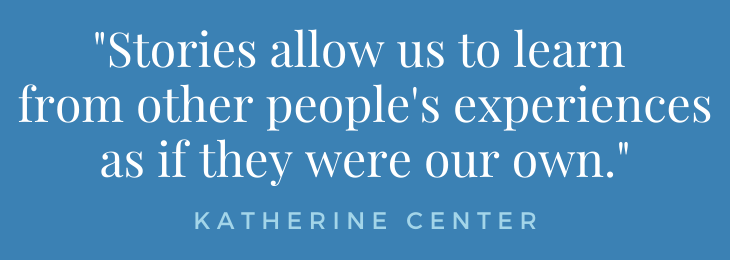
I don’t write stories about Duran Duran anymore.
But in a funny way, the essentials haven’t changed.
I still write for fun, and for love, and for joy. I still write to give myself something to look forward to—both in real life and in the story. I’m still writing for my own inner reader—and I’m still trying to make her laugh, and keep her up late turning pages, and make her believe in hope. I’m still trying to understand forgiveness, and practice resilience, and remember to be grateful.
And so I write stories about finding joy in the struggle, and standing up to be brave, and savoring every little moment of grace. All things I’m trying to do in real life.
It’s work, but it feels like play. That’s how I know I’ve got it right.
It’s true for writing and it’s true for reading. The only compass you can follow is your own.
Trust me on this. You won’t regret it. Read for joy.

Here’s an excerpt from a talk Katherine gave for
the Texas Library Association about why we should all read for joy.
JOIN Katherine’s email list!
CONNECT with Katherine on Instagram!
